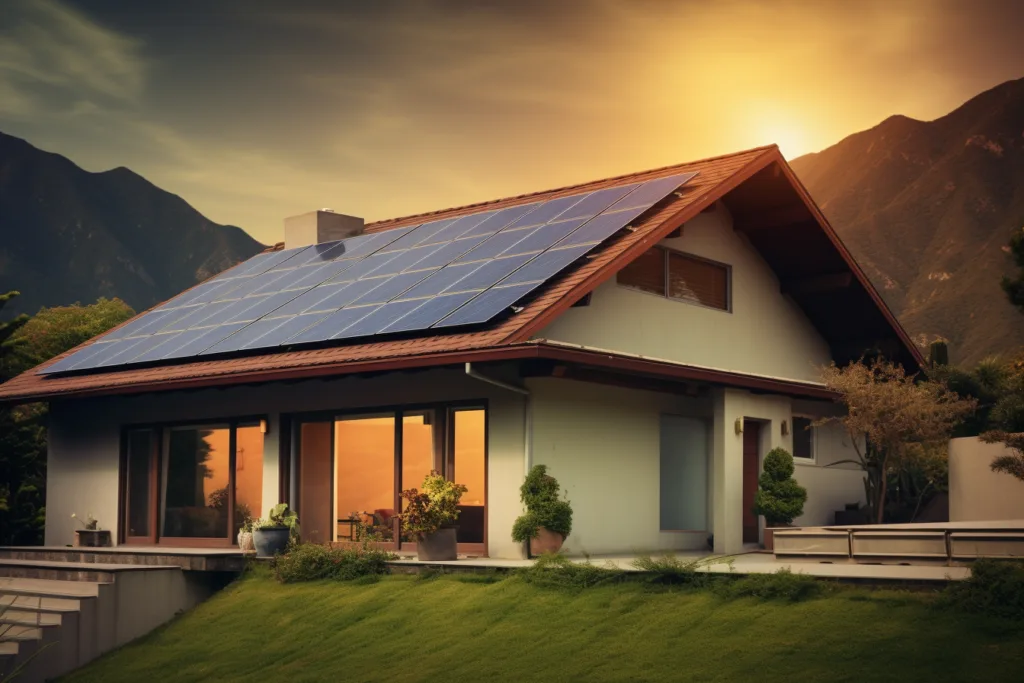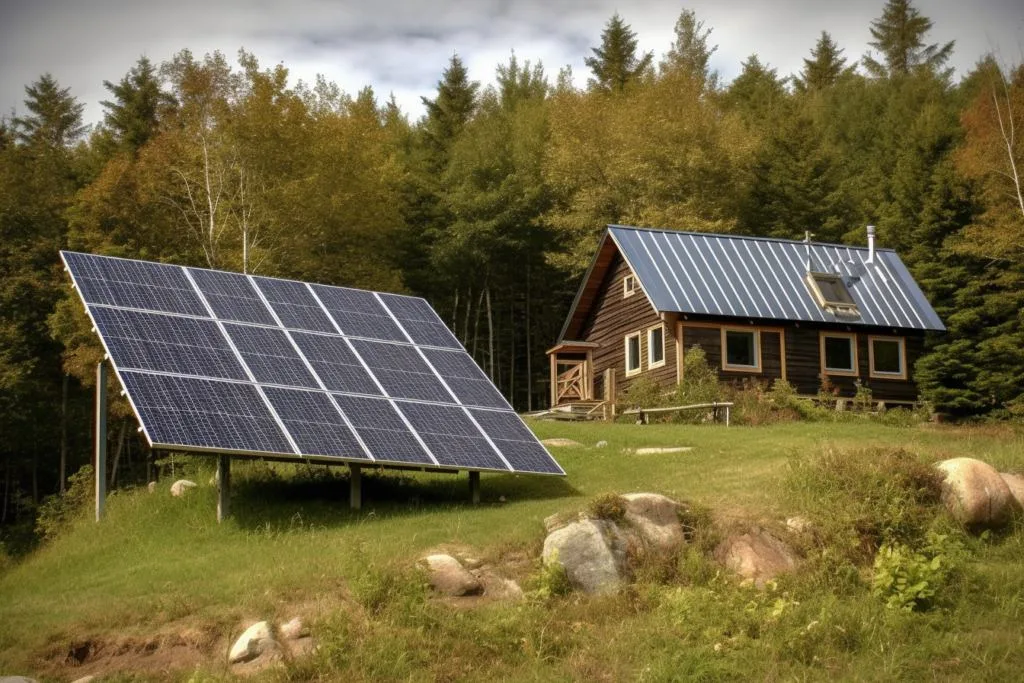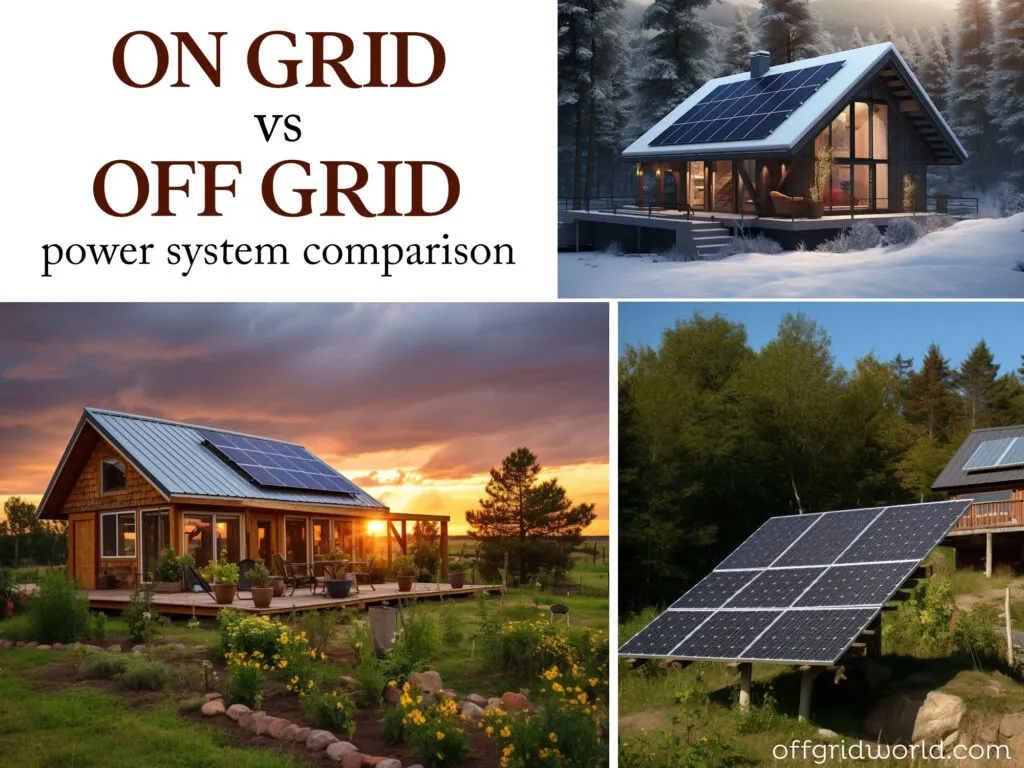Choosing the right solar power system is important for homeowners as it significantly impacts energy usage, costs, and sustainability. The two primary options are on-grid (grid-tied) and off-grid solar energy systems, each offering unique benefits and drawbacks.
This article will delve into the essential details of these systems and help you make an informed decision that best suits your circumstances and preferences.
Key Takeaways
- On-grid solar systems are connected to the utility grid, allowing constant electricity access and net metering benefits.
- Off-grid solar systems offer complete energy independence, relying on solar panels and batteries for power generation and storage.
- Grid-tied solar systems typically have lower upfront costs than off-grid solutions and can save on electricity bills.
- Off-grid systems have higher initial investments but provide energy self-reliance and can lead to long-term cost savings.
- Hybrid solar energy systems combine on-grid reliability with off-grid independence, offering backup power during outages and energy savings.
- Energy security is crucial in choosing between solar system types, with off-grid and hybrid systems providing resilience against power outages.

Grid-Tied and Off-Grid Solar Power Systems
As the popularity of renewable energy increases, homeowners are exploring various options for eco-friendly and cost-effective power solutions.
Solar power systems, in particular, come in two primary flavors: grid-tied solar (or on-grid) and off-grid solar. Both types have unique advantages and challenges, tailored to various power needs and preferences.
The key differences between these solar power systems lie in their energy independence and their electric grid connection.
- Grid-tied solar (on-grid) systems: These solar power systems are directly connected to the public grid. Homeowners can draw additional power from the grid whenever their solar panels are not producing enough electricity. Conversely, during periods of excess production, homeowners can send surplus power back to the grid. Grid-tied systems are an attractive option for those who want constant access to electricity without entirely cutting ties with their utility provider.
- Off-grid solar systems: Off grid solar systems work independently from the utility grid. They solely rely on the power generated by solar panels, which is typically stored in batteries for continuous supply. Off grid systems are designed for those who desire complete energy independence and wish to disconnect from their utility providers. These systems need more sophisticated planning, management, and investment in energy storage solutions such as batteries to ensure a stable power supply.
Choosing between grid-tied and off-grid solar power systems depends on your specific needs, location, budget, and preference for energy independence. Both systems support the ultimate goal of harnessing clean, renewable energy while minimizing environmental impact.
The Basics of On-Grid Solar Energy
On-grid solar systems, also known as grid-tied solar power systems, are designed to work in tandem with the utility grid to provide a steady flow of electricity and tap into the benefits of net metering. This section will delve into the fundamentals of on-grid solar energy by explaining how these systems interact with the grid and the financial advantages.
How On-Grid Systems Work with the Utility Grid
On-grid solar power systems are connected to the grid and designed to generate electricity for homes and businesses. When a solar panel array produces more electricity than needed, the excess power is sent back to the grid.
This relationship between the solar panel system and the grid is made possible by solar inverters, which convert the direct current (DC) generated by solar panels to alternating current (AC), enabling both household use and grid compatibility.
To break the process down simply:
- Solar panels absorb sunlight and produce direct current (DC) electricity.
- The solar inverter converts DC to alternating current (AC) suitable for household use.
- Excess electricity is sent back to the utility grid, fostering electricity savings.
Net Metering and Its Financial Benefits
Net metering is a crucial aspect of on-grid solar energy systems, as it allows homeowners to receive financial compensation from utility companies for the excess electricity sent back to the grid. In many states across the U.S., utility companies are required to credit solar system owners for their contribution, resulting in reduced electricity bills and improved return on investment for solar installations.
Some of the advantages of grid-tied systems include:
- Utility company compensation: When your solar power system sends excess electricity to the grid, you receive credits that can be applied to your electricity bill.
- Electricity savings: Credits received can significantly reduce your electricity expenses, especially during high-production months.
- Optimized investment returns: Consistent sell-back benefits can enhance the long-term financial viability of your solar power system.

Living Off the Grid: What Does It Really Mean?
Off grid living represents a conscious decision to achieve energy independence and fully rely on self-sufficient power systems, such as solar panels and batteries.
The core principle of this approach to electricity involves disconnecting from the traditional electrical grid and producing one’s own energy, typically through renewable sources. While this lifestyle choice requires upfront investments and ongoing maintenance, it can lead to numerous financial and environmental benefits.
Off grid solar energy systems are built to accumulate and store excess energy generated during the day, ensuring continuous electricity supply during non-productive periods like nighttime or overcast days. The process usually involves an interaction between solar panels, a charge controller, a battery bank, and the inverter that converts the stored electricity for domestic use.
Adopting an off-grid lifestyle means taking complete control over one’s energy consumption and resilience in the face of grid-dependent challenges.
Some of the advantages of off-grid living include:
- No utility bills: By generating and storing your own electricity, you can eliminate your dependence on utility companies and enjoy freedom from monthly electricity bills.
- Greater control over energy consumption: Being responsible for your energy production and storage provides insight into your consumption habits and the opportunity to make informed decisions for optimizing your home’s energy usage.
- Uninterrupted power supply: Off grid systems ensure consistent electricity availability even during grid failures, making them ideal for remote locations or areas susceptible to natural disasters and power outages.
- Reduced carbon footprint: Utilizing renewable energy sources, such as solar power, minimizes greenhouse gas emissions and supports a more sustainable way of life.
Despite its numerous benefits, choosing to take your energy off grid requires careful consideration of various factors, from the initial investment in solar panels and batteries to the ongoing maintenance and monitoring of the energy system.
Additionally, integrating energy-efficient appliances and employing responsible consumption practices are essential aspects of successful off-grid living. Many off-gridders keep a backup generator or other alternate power sources available in case of problems with their primary system.
Comparing the Costs: Off-Grid vs. On-Grid Solar Systems
Installing a solar power system can be a significant investment, and the costs can vary depending on whether you choose off-grid or on-grid solar. Let’s explore the differences in initial investment, long-term savings, and maintenance costs for both systems to help you decide on a cost-effective energy solution.
Initial Investment and Long-Term Savings
On-grid solar systems are typically less expensive to install, as they do not require battery storage or other additional equipment. While the initial investment for an on-grid setup may be lower, off-grid solutions can lead to significant long-term solar savings by eliminating the reliance on utility companies. This is especially true when you consider available tax credits and the ever-increasing costs of conventional energy sources.
- On-grid solar systems: Lower upfront cost, potential savings by selling back power
- Off-grid solar systems: Higher initial investment, long-term independence from rising utility costs
It is important to weigh the upfront costs against the potential long-term financial benefits when deciding between the two types of solar systems.
Maintenance and Operational Costs Over Time
Beyond their original investments, both off-grid and on-grid solar systems have ongoing costs related to operation and maintenance. While they typically require less attention, on-grid systems are still subject to utility fees. On the other hand, the operational costs of off-grid systems may be higher due to more frequent maintenance, particularly for the battery storage systems. Potential battery replacement fees should also be considered.
- On-grid solar systems: Generally lower maintenance, steady utility fees
- Off-grid solar systems: Possible higher maintenance costs, more self-sufficient power
Solar panel technology continues to improve, with current solar panel longevity often exceeding 25 years. Likewise, advancements in battery technology are rapidly extending battery efficiencies and lowering maintenance needs. When comparing costs, be sure to factor in durability as part of your long-term financial plan for your solar investment.

The Role of Batteries in Off-Grid Systems
Solar batteries play a crucial part in energy storage solutions for off-grid systems, facilitating the continuous supply of solar-generated electricity even during non-productive periods. As an essential component of off-grid systems, batteries provide reliable access to power and help users maximize energy independence.
Recent advances in battery technology have significantly improved the efficiency, lifespan, and affordability of solar batteries. In particular, lithium-ion and lithium-iron-phosphate (LFP) batteries have emerged as game-changers in the field, offering substantial benefits for homeowners who opt for off-grid solar energy systems:
- Longer life spans: Lithium-ion and LFP batteries tend to have much longer life spans than traditional lead-acid options, resulting in a more sustainable storage solution that lasts for years.
- Improved efficiency: These cutting-edge batteries have a significantly higher efficiency at storing and discharging electrical energy, ensuring you make the most of your solar energy production.
- Cost-effectiveness: The constantly evolving battery market has led to greater affordability and more cost-effective options for solar energy storage, making off-grid systems increasingly attractive to homeowners.
Furthermore, the ability to expand battery storage capacity provides homeowners with the flexibility to tailor their off-grid solar systems to specific needs and preferences. This customizability empowers users to create personalized energy storage solutions that cater to their lifestyle and energy consumption habits, further enhancing the appeal of off-grid solar systems.
Advantages of Hybrid Solar Energy Systems
Hybrid solar energy systems offer an innovative solution to homeowners seeking both energy independence and grid reliability. These systems combine the benefits of on-grid solar and off-grid systems, seamlessly integrating battery storage and grid connection as a supplemental power source. This ensures a continuous and reliable electricity supply while optimizing energy savings through net metering benefits.
Combining On-Grid Reliability with Off Grid Independence
By integrating the advantages of on-grid systems, such as net metering, with the energy independence of off-grid setups, hybrid solar systems provide a perfect middle ground for homeowners seeking the best of both worlds. These systems store excess solar energy in batteries, ensuring backup power during outages and potential energy savings.
Hybrid solar systems provide continuous electricity supply by drawing from the grid when necessary, ensuring the advantages of both on-grid and off-grid solar setups, while somewhat increasing the initial investment.
The Best of Both Worlds: Backup Power and Energy Savings
One of the main benefits of hybrid solar systems is their ability to provide backup power during outages, ensuring uninterrupted electricity supply for homeowners. This reduces reliance on fossil fuel backup generators and contributes to energy conservation efforts. Moreover, hybrid systems can still deliver the energy savings associated with on-grid solar systems through net metering benefits, allowing homeowners to offset their electricity consumption by feeding excess power back to the grid.
Hybrid system benefits:
- Continuous electricity supply in the event of grid outages
- Energy savings through net metering benefits
- Reduced reliance on conventional fossil fuel-based backup power sources
- Increased control over energy consumption and management
Energy Security: How Power Outages Affect Your Choice
Energy security is increasingly important in the modern world, as extreme weather events and power outages increase. Identifying the most suitable solar energy system is significantly influenced by the ability to provide constant electricity during periods of grid downtime. Here, we will discuss how the possibility of power outages impacts your decisions when choosing between on-grid, off-grid, and hybrid solar systems.
On-grid systems are dependent on the utility grid for constant electricity supply. If the grid experiences a power outage, your solar power supply will be disrupted as well. Consequently, homes and businesses with grid-tied solar energy systems are vulnerable to blackouts during extreme weather conditions or grid outages. For locations prone to these situations, opting for an on-grid system without battery backup may pose a risk to your energy security.
Off-grid systems, on the other hand, are not connected to the utility grid and rely on solar panels and battery storage for all energy needs. This setup allows for an uninterrupted power supply during grid outages, ensuring that your home or business maintains access to electricity when it’s needed the most. This is especially important for those in remote areas, where power can take longer to restore after outages. Off-grid solar systems enable users to maintain energy security and off grid reliability in the face of outages and other emergencies.
Hybrid systems integrate both grid-tied and off-grid functionalities and may provide the optimal solution for achieving the best of both worlds. These systems use solar battery storage, combined with the utility grid, to ensure electricity is continuously available during power outages. As a result, users can enjoy the solar power resilience and energy security offered by off-grid systems, while also benefiting from the convenience and financial advantages of grid-tied solar energy solutions.
Essentially, your choice of solar power system hinges on multiple factors, including:
- The frequency of power outages in your area
- Your preference for energy security and independence
- Initial investment and operational costs for each system type
- The desired level of environmental sustainability
By weighing these considerations carefully, you can make an informed decision about which solar energy system best meets your unique energy security needs and preferences.

Conclusion
Considering the comparison between on-grid and off-grid solar systems, it becomes evident that the appropriate choice depends on various personal factors, such as location, energy needs, financial capacity, and the desire for energy security.
Both on-grid and off-grid systems provide valuable pathways to harness renewable energy sources, effectively reduce carbon footprints, and generate potential cost savings in the long run.
Hybrid systems serve as an excellent middle ground, offering a combination of benefits from both on-grid and off-grid solutions.
With technological advancements constantly improving solar energy systems, more individuals and businesses can take advantage of the benefits they present. Government incentives and tax credits further enhance the attractiveness of such investments, making solar power an increasingly sensible and environmentally conscious choice for a wide array of consumers.
FAQ
What is the difference between on-grid and off-grid solar power systems?
On-grid (grid-tied) systems connect to the public utility grid, providing homeowners with continuous access to electricity and the ability to send excess energy back to the grid. Off-grid systems, however, are independent of the utility grid, relying entirely on solar-generated power and battery storage for electricity supply.
How do on-grid systems work with net metering?
On-grid solar systems can send excess energy back to the grid through net metering, which results in utility companies providing homeowners with credit for the surplus electricity they generate. This can lead to substantial savings on energy bills and optimize investment returns on solar power installations.
What are the benefits of off-grid living?
Off-grid living offers complete energy independence, with no utility bills, greater control over energy consumption, and uninterrupted access to electricity during grid failures. It enables a sustainable and self-reliant lifestyle by harnessing solar energy and relying on battery storage systems.
How do initial investments and long-term savings compare between on-grid and off-grid solar systems?
On-grid solar systems generally have a lower upfront cost due to the lack of battery storage, while off-grid systems require higher initial investments for batteries and additional equipment. However, off-grid systems can lead to substantial long-term savings by completely eliminating reliance on utility companies.
What role do batteries play in off-grid solar systems?
Batteries are essential in off-grid systems, as they store excess solar-generated electricity for use during non-productive periods like nighttime or cloudy days. Advances in battery technology, such as lithium-ion and lithium-iron-phosphate (LFP), have led to longer life spans, improved efficiency, and more cost-effective options.
What benefits do hybrid solar energy systems offer?
Hybrid solar energy systems combine the reliability of on-grid connectivity with the independence of off-grid solutions. They provide backup power during outages and allow for net metering through the utility grid. Essentially, hybrid systems offer continuous access to electricity while optimizing the advantages of both on-grid and off-grid solar setups, albeit at a somewhat higher initial investment.
How do power outages affect the choice between on-grid, off-grid, and hybrid systems?
Energy security is a key factor in choosing the right type of solar system. Off-grid and hybrid systems offer power resilience during grid failures, whereas grid-tied systems without battery backup can be vulnerable to blackouts. The decision ultimately depends on balancing the need for reliable energy supply against the investment and operational considerations of each system type.

